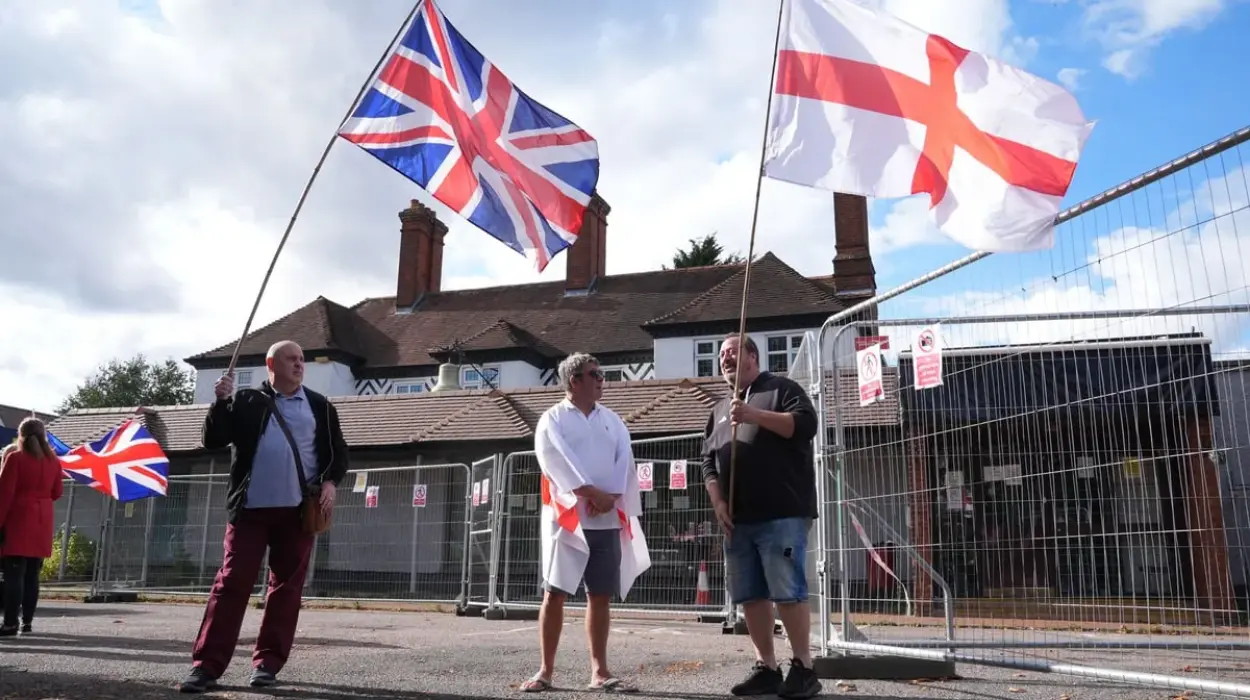UK (Parliament Politics Magazine) – British High Court rules asylum seekers can remain at Epping’s Bell Hotel, denying council injunctions despite local protests and security concerns.
As reported by The Independent, a High Court judge has denied Epping council’s attempt to stop asylum seekers from staying at a hotel that has faced local protests.
Epping Forest District Council challenged Somani Hotels in court, accusing them of violating planning rules by housing asylum seekers.
The hotel sparked protests over the summer after migrant Hadush Kebatu was sentenced for sexually assaulting a woman and a 14-year-old girl.
What did the High Court say about asylum seekers staying at Epping’s Bell Hotel?
Epping Council attempted to block migrants from staying at the hotel, arguing in the High Court that it had become a “feeding ground for unrest and protest.”
The council was first awarded a temporary injunction to halt 138 asylum seekers from being accommodated at the hotel past 12 September. The ruling could disrupt the government’s asylum policy after more councils indicated they might seek similar challenges.
The injunction was later overturned on appeal, with the court calling the original decision “seriously flawed in principle.”
Mr Justice Mould of the High Court ruled asylum seekers may stay at the hotel, leaving safety concerns under police responsibility.
The High Court judge said on Tuesday that using the hotel to accommodate asylum seekers was not a serious breach of planning rules.
He said there was “no evidence” to suggest that accommodating asylum seekers at the hotel strained local medical, social, or community services.
Mr Justice Mould added,
“There is no evidential basis at all for the assertion that asylum seekers as a cohort have a greater propensity than the settled population to engage in criminal or anti-social behaviour.”
The judge stated that there is a clear
“continuing need to source contingency accommodation for asylum seekers from hotels”
and concluded that the
“planning and environmental harm resulting from the current use of The Bell is limited.”
Mr Justice Mould continued,
“It has not been established that those fears and concerns properly relate to and are grounded in the use of The Bell as contingency accommodation for asylum seekers, rather than being the understandable reaction of local residents to the well-publicised criminal behaviour, actual and alleged, of three individuals who happen to be accommodated there.”
How did the High Court decision impact Epping’s migrant hotel protests?
Shadow home secretary Chris Philp said that the High Court’s ruling was
“a dark day for local democracy and a slap in the face to the people of Epping.”
He added,
“A Labour government has once again used the courts to put the rights of illegal immigrants above the rights of British citizens.”
Officials from the Home Office argued in court that asylum seekers should remain at the hotel, warning that an injunction could prompt other councils to pursue similar legal action.
They argued that
“the available asylum estate is subject to incredibly high levels of demand.”
The director of asylum support, Becca Jones, warned that the loss of spaces at The Bell Hotel would be “significant” due to rising small boat arrivals.
She added that the Home Office would
“face considerable difficulties in re-accommodating them [asylum seekers] appropriately.”
The Essex hotel sparked protests over the summer after an Ethiopian national was jailed for 12 months, then mistakenly released and re-detained.
Syrian asylum seeker Mohammed Sharwarq, living at the hotel, was jailed for 16 weeks after admitting assaults on residents and staff.
How does the UK plan to overhaul immigration using Denmark’s model?
Home Secretary Shabana Mahmood plans a major immigration overhaul, modelling UK rules on Denmark’s strict system.
Officials are reportedly examining Denmark’s strict rules and may restrict most asylum seekers in the UK to temporary stays.
Labour MPs are divided over Danish-style immigration plans, with some red wall MPs pushing for tougher measures, while others fear shifting the party too far right.
How many asylum seekers are in the UK?
A record 111,084 people claimed asylum in the UK, which is 14% more than the previous year and the highest number on record since 1979.
Around 109,500 people were still awaiting an initial decision on their asylum claim, showing a decrease from previous peaks but still historically high.


